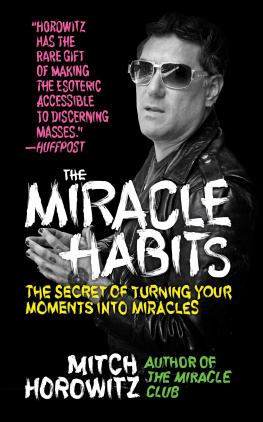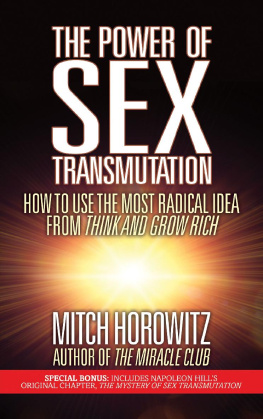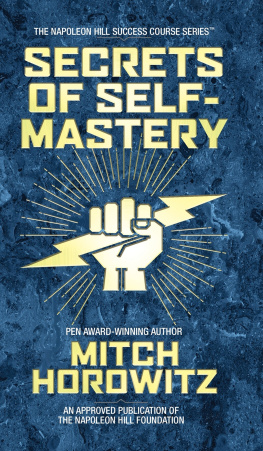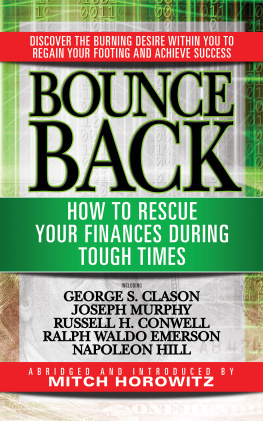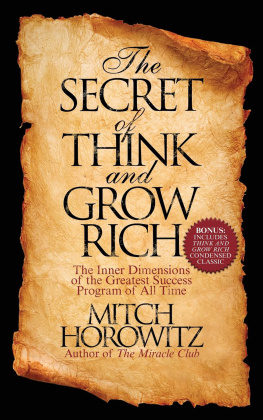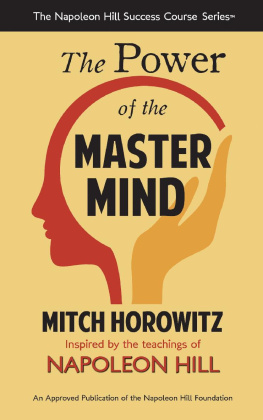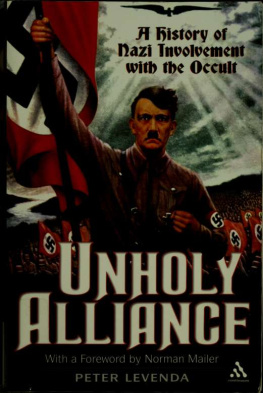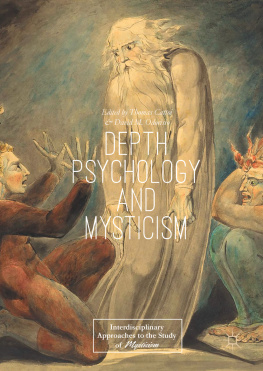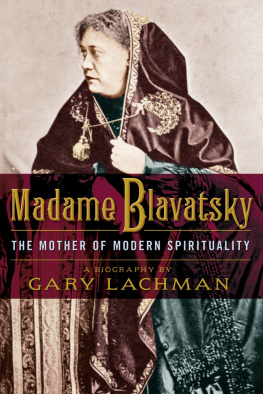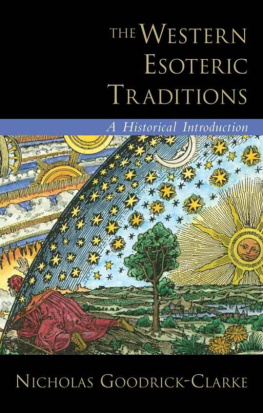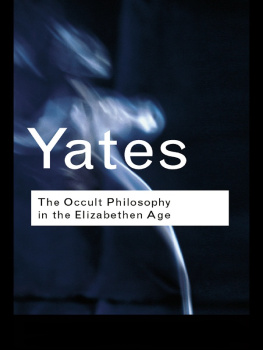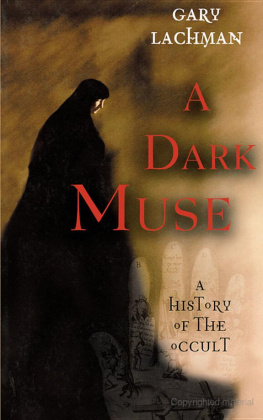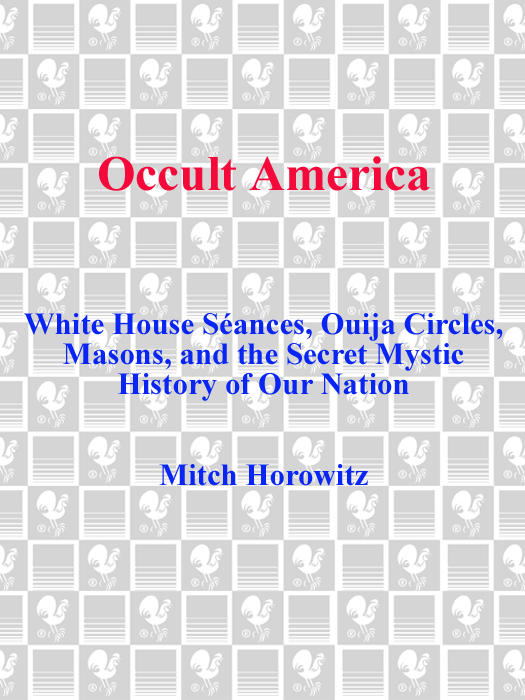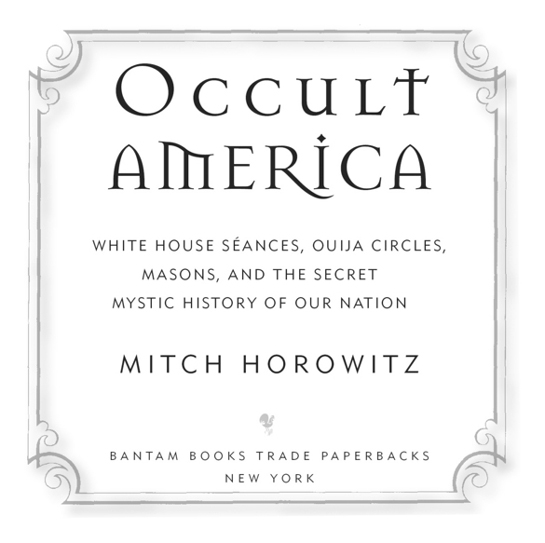Praise for Occult America
Teases out fascinating stories of the dreamers and planners who flourished along the Psychic Highway.
D ANIEL S TASHOWER , The Washington Post Book World
A treasure trove What Mr. Horowitz has done is link the mystical history of the United States into a coherent, fascinating narrative. His section on fascism and the occult is the clearest Ive ever read.
S USAN C ORSO , The Huffington Post
A brilliant job of tracking down how positive thinker Norman Vincent Peale borrowed his core self-help philosophy from a religious movement called New Thought.
J ULIA D UIN , The Washington Times
Employing extensive research while writing with an authoritative tone, Horowitz succeeds in showing how a new spiritual culture developed in America.
Publishers Weekly
Treats esoteric ideas and movements with an even-handed intellectual studiousness that is too often lost in todays raised-voice discussions about religion and belief systems.
C HRISTOPHER P ORTER , Washington Post Express
Patriots and paranoids alike have tramped through this field, and it badly needed sorting out. Mitch Horowitz does it with scholarship, style, and tales that evoke wide-eyed amazement.
J OSCELYN G ODWIN , professor of music, Colgate University
This enthralling read tells the surprising story of how occult spirituality in America informed the rise of progressivism, equal rights, and the belief in the universality of religious truth.
E NLIGHTEN N EXT
A fascinating look at the role of mysticism and alternative spirituality in our nations history.
Seattle Post-Intelligencer
A fantastic tour guide to the fringes of reason, high weirdness, deep esoterica, secret societies, and mystery religions.
D AVID P ESCOVITZ , Boing Boing
One of the best recent books on patterns of belief.
R OBERT G UFFEY , Fortean Times
Reveals the mystical and occult origins of some of our most valued philosophies.
K RISTINE M ORRIS , Spirituality & Health
A wild intellectual ride Its amazing to think that todays societal ideals such as equality and personal development are offshoots of the beliefs of various mystical subcultures and alternative thought leaders, but Horowitzs arguments are entirely convincing.
P AM G ROSSMAN , Phantasmaphile
A sparkling, down-to-earth, and often deeply touching account of a powerful, much misunderstood force in the formation of Americas cultural and spiritual identity.
J ACOB N EEDLEMAN , author of The American Soul
Occult America is a truly remarkable achievement.
J OHN S. D. E ISENHOWER , author of The Bitter Woods
A fantastic work. A truly artful blend of criticism and sympathy.
J EFFREY J. K RIPAL , chair of the Department of Religious Studies, Rice University
A 2010 Bantam Books Trade Paperback Edition
Copyright 2009 by Mitch Horowitz
All rights reserved.
Published in the United States by Bantam Books, an imprint of The Random House Publishing Group, a division of Random House, Inc., New York.
B ANTAM B OOKS and the rooster colophon are registered trademarks of Random House, Inc.
Originally published in hardcover in the United States by Bantam Books, an imprint of The Random House Publishing Group, a division of Random House, Inc., in 2009.
Library of Congress Cataloging-in-Publication Data
Horowitz, Mitch.
Occult America : white house sances, ouija circles, masons, and
the secret mystic history of our nation / Mitch Horowitz.
p. cm.
eISBN: 978-0-553-90698-1
1. OccultismUnited StatesHistory. 2. Parapsychology
United StatesHistory. I. Title.
BF1434.U6H67 2009
130dc21
2009009864
www.bantamdell.com
v3.1_r1
To Allison,
who makes everything possible
O Egypt, Egypt, there will remain of thy religion only fables
H ERMETICA
Contents
Introduction: What Is the Occult?
(And What Is It Doing in America?)
I NTRODUCTION
WHAT IS THE OCCULT?
(And What Is It Doing in America?)
Religious history, like literary or any cultural history, is made by genius, by the mystery of rare human personalities.
H AROLD B LOOM , T HE A MERICAN R ELIGION
I n the summer of 1693, the philosopher Johannes Kelpius and a small band of followers fled their Rhine Valley homeland. The region had once been a sanctuary of political independence and esoteric spirituality. It was now a charred land of devastation, crushed by the papal Habsburg Empire during the Thirty Years War.
The twenty-one-year-old Kelpius, a protg of mystical scholars who survived in the Rhine corridor, led his German pilgrims to the New World. Fewer than forty in number, they first traveled over land and later endured a five-month sea voyage, which proved less dangerous for the weather than for warring French and British ships crisscrossing Atlantic routes. By late June of 1694, the group reached Philadelphia, then a cluster of about five hundred houses. They settled along the wooded banks of the Wissahickon Creek outside town. There they lived a monastic existence, occupying caves and constructing a forty-foot-square log tabernacle topped with a telescope, from which they scanned the stars for holy signs. By sunlight and hearth fire, they studied astrology, alchemy, number symbolism, esoteric Christianity, Kabala, and other philosophies that had once flowered back home. Newcomers journeyed to America to join their Tabernacle in the Forest, and in the years following Kelpiuss death from tuberculosis in 1708, they created a larger commune at Ephrata, Pennsylvania.
News drifted back to the Old World: A land existed where mystical thinkers and mystery religionsremnants of esoteric movements that had thrived during the Renaissance and were later harassedcould find safe harbor. And so began a revolution in religious life that was eventually felt around the earth. America hosted a remarkable assortment of breakaway faiths, from Mormonism to Seventh-day Adventism to Christian Science. But one movement that grew within its borders came to wield radical influence over nineteenth- and twentieth-century spirituality. It encompassed a wide array of mystical philosophies and mythical lore, particularly the belief in an unseen world whose forces act upon us and through us. It is called the occult.
The teachers and purveyors of the American occultcolorful, audacious, and often deeply self-educated men and womenshattered every stereotype, real and imagined, of the power-mad dabbler in dark arts. Rather than seeing mystical or magical ideas as a means to narcissistic power or moral freedom, they emphasized an unlikely ethic of social progress and individual betterment. These religious radicals, acting outside the folds of traditional churches and mostly overlooked or ignored in the pages of history, transformed a young nation into the launching pad for the revolutions in therapeutic and alternative spirituality that swept the earth in the nineteenth and twentieth centuries, even reigniting mystical traditions in the East.


